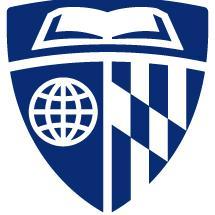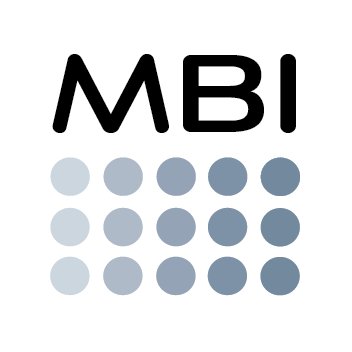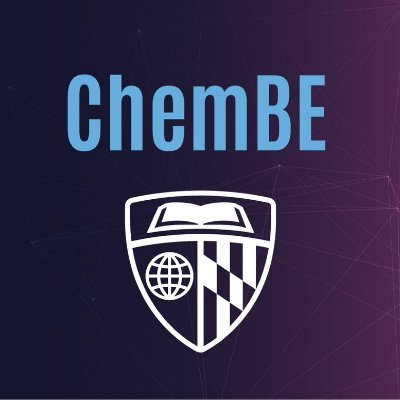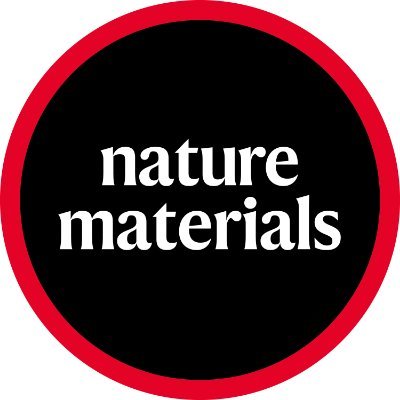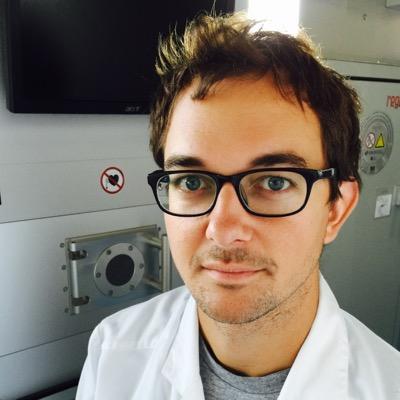
AliceAmitrano
@alice_amitrano
Followers
121
Following
575
Media
11
Statuses
162
Rome🇮🇹 Chemical engineering PhD student at Johns Hopkins University / Konstantopoulos lab / Institute of NanoBioTechnology (INBT) 🧫🔬🥼. -UD’21🎓
Rome, Lazio
Joined December 2017
Thrilled to share me and @YQinling latest work published in @ScienceAdvances. Our research explores the interplay between hmsc fate and fluid viscosity. A big thank you to my advisor, colleagues and our collaborators for their guidance and invaluable support. 🎉
Check out our latest work on fluid viscosity and hMSC fate in @ScienceAdvances led by @alice_amitrano and @YQinling . Many thanks to @KKLabJHU members @BhawanaAg12 and @Anindya_SenJHU, our collaborators @JudeM_Phillip and Dr. Gu and their mentees.
0
0
14
How do cells sense their environment when mechanics fail? In our new PNAS paper, we @SXS_biophysics @KKLabJHU reveal a chemical compensation mechanism to mechanical loss: disrupting actomyosin activates PI3K/Akt to restore cell volume and pH regulation.
pnas.org
Mammalian cells sense and respond to environmental changes using a complex and intelligent system that integrates chemical and mechanical signals. ...
0
2
5
The Konstantopoulos Lab is heading to #AIChE2025 in Boston to share our latest discoveries in cell mechanobiology and microenvironmental cues. Stay tuned for exciting talks! #AIChEAnnual🧪
0
5
15
So excited to see our lab’s work featured at #BMES2025! I’ll be presenting how stiffness and confinement regulate cancer cell bioenergetics and migration! Come find us in San Diego 💥
🎉 Excited to share that the Konstantopoulos Lab will be presenting our latest work at #BMES2025! Come check out our talks, spanning mechanobiology, cancer invasion, and bioengineering innovation. 🧠🔬 See details below 👇
0
2
5
In @NatureMaterials: A promising new target for cancer therapy. @JHU_ChemBE Prof Kostas Konstantopoulos and team discovered that two proteins crucial for cell division—anillin and Ect2—also enable cancer cells to invade tissues and spread.
engineering.jhu.edu
Johns Hopkins engineers have discovered that two proteins essential for cell division also help cancer cells metastasize, or spread, especially through tight spaces. Findings could lead to new...
0
5
4
@BhawanaAg12 from @KKLabJHU shows how extracellular viscosity can have lasting effects on stem cell fate and polarization of macrophages into pro/anti inflammatory types. The findings pave new paths for regenerative and immunosuppressive therapies. #mbimpg2025
0
3
4
Johns Hopkins engineers have discovered two proteins key to cell division also help cancer cells spread, especially through tight spaces. The results have the potential to identify new anti-metastasis drug targets. Learn more:
engineering.jhu.edu
Johns Hopkins engineers have discovered that two proteins essential for cell division also help cancer cells metastasize, or spread, especially through tight spaces. The proteins anillin and Ect2,...
0
1
1
Pleased to share our latest collaborative work with the @DevreotesLab in @PNASNews. Using optogenetics, we show that both insufficient and excessive Ras activity impair cell motility, underscoring the need for optimal Ras signaling and cortical tension.
pnas.org
Ras has traditionally been regarded as a positive regulator and therapeutic target due to its role in cell proliferation, but recent findings indic...
1
9
28
Cell migration in confined environments is initiated by a cytoplasmic pool of anillin and Ect2 that promotes RhoA/myosin II-mediated activation at the poles of migrating cells, in a process dependent on the extracellular environment stiffness. https://t.co/Meppu3rBEh
nature.com
Nature Materials - Cell migration in confined environments is initiated by a cytoplasmic pool of anillin and Ect2 that promotes RhoA/myosin II-mediated activation at the poles of migrating cells,...
1
4
13
Grateful to be part of this impactful work with a fantastic team. Congrats to everyone involved! Don’t miss it ⬇️
Thrilled that our newest work led by @AveryTTran, Dr. Wisniewski, and @mistrigr is out today in @NatureMaterials! We show how the cytokinesis proteins Anillin and Ect2 drive RhoA/ROCK/myosin-mediated invasion in confining spaces in vitro and in vivo. https://t.co/HXCOZmcXKv.
0
1
5
Excited to share our work in Nature Methods! InterpolAI is a deep learning framework that uses optical flow to interpolate and restore missing or damaged biomedical images, allowing enhanced 3D maps across diverse imaging modalities. Read more: https://t.co/fyKH6XEl2l
1
8
25
Fresh science! Check out our @ConfinementLab’s new paper on how confined migration can drive stem cell differentiation in @AdvPortfolio. Let’s do a thread! https://t.co/Ve5rWfy748 (1/n)
advanced.onlinelibrary.wiley.com
Human mesenchymal stem cell (hMSC) homing to sites of regeneration requires navigation through mechanically confining extracellular matrix environments, inducing rapid and dramatic morphological...
4
13
44
It was an incredible honor to receive the WSE Doctoral Student Excellence in Leadership Award. I’m grateful for this recognition and proud to be part of such a supportive and inspiring community.
Congrats to my brilliant PhD student @alice_amitrano, recipient of the @HopkinsEngineer Doctoral Student Excellence in Leadership Award! A standout leader in our grad community, and scholar with articles in Science Advances , Current Opinion Cell Bio, Nano Letters & Nature Mat.
0
1
9
Immense congrats to my amazing postdoc @debanikch for winning the Best Poster Award at the 18th Nano-Bio Symposium at @INBT_JHU ! In just one year, he’s co-led a COCB article https://t.co/eH4TkeEZ7x…, a book chapter , and has several more in the pipeline. Well-deserved!
1
3
19
Huge congrats to my first-year PhD student, Josiah Power @realjosiahpower on receiving an @NSF GRFP! At just 19 and with a double-major in ChemBE & Biochem, he took 5 doctoral-level courses last fall (vs. the usual 3) and aced them all. Incredible talent and drive- well deserved!
0
3
34
Excited to share our new publication https://t.co/j6Os9vlZNY , showing that viscoelastic matrix enhances cell plasticity and reprogramming efficiency. Congratulations and thanks to Yifan Wu, the team members, and collaborators!
nature.com
Nature Communications - Extracellular matrices are viscoelastic, yet how matrix viscoelasticity regulates the epigenome remains unclear. Here, the authors show that cells cultured on viscoelastic...
2
5
46
Super excited to share the latest paper from my group published in @ScienceAdvances . "Single-cell morphology encodes functional subtypes of senescence in aging human dermal fibroblasts" @JHUBME @JHU_ChemBE @INBT_JHU @HopkinsEngineer @JohnsHopkins
https://t.co/ilfZ6HWbMo
science.org
Single-cell morphologies reveal functional subtypes of senescence.
11
11
30
Putting the brightest inquisitive minds together to find cures for cancer @MayoClinicNeuro
@MayoClinic
@MayoCancerCare
@HopkinsNsurg
@HopkinsEngineer
@JohnsHopkins
@uminn
@UMBaltimore
@KKLabJHU
#washDC
@paosmeade
@HugoGuerreroLab
@Honggangcui
@MayoInvents Inspiring
2
6
62
Quick trip to DC for the Inquisitive minds retreat! Two days full of discussions on how to treat brain cancer from different angles. @DoctorQMd @KKLabJHU @alice_amitrano
3
3
44
In @ScienceAdvances: With NIH support, @JHU_ChemBE doctoral students Alice Amitrano and Qinling Yuan find that viscosity of fluid around stem cells can have a big impact on development, opening up new possibilities for advancing regenerative medicine.
engineering.jhu.edu
Johns Hopkins engineers have discovered how the thickness of fluids surrounding stem cells can affect their behavior and development—insights that have the potential to enhance therapies for bone...
0
6
12




